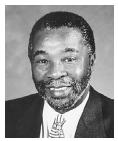SOUTH AFRICA
Thabo Mbeki
President

(pronounced "TAH-bow em-BECK-ee")
"Affirmative action isn't a philosophy. It's not an end in itself. It's an instrument to get a more equal society, broadly representative of South African demography."
The Republic of South Africa, located at the southern tip of the African continent, is bordered to its northeast by Swaziland, Mozambique, and Zimbabwe, to the north by Botswana, and to the northwest by Namibia. Lesotho, an independent kingdom, is an enclave within South Africa. The country has a total land area of 1,219,584 sq km (470,882 sq mi).
South Africa's population, estimated at 43,647,658 in July 2002, is composed of four distinct groups: 75.2% black, consisting mainly of Xhosa, Zulu, and Sotho, (collectively known as Bantu); 13.6% white, comprising Dutch-descended Afrikaners and whites of British descent; 8.6% of mixed heritage ("colored"); and 2.6% Asian, primarily from the Indian subcontinent. Reflective of this multicultural society, there are 11 official languages with Ndeble, Sotho, Pedi, English, and Afrikaans most widely spoken.
South Africa has an advanced industrial economy with manufacturing and services accounting for 63% of total employment. The country possesses abundant natural resources, particularly minerals. It accounts for one-third of the world's gold output. Agriculture is South Africa's second major employer, accounting for 30% of the labor force. While the per capita income was estimated at US $9,400 in 2001, the average income of whites is about tenfold greater than that of blacks. The unemployment rate for the country is estimated at 37%, but white unemployment has been estimated at 4%, and black joblessness exceeds 40%. The national currency is the rand.
ADDRESS
State President's Office
Union Buildings, Western Wing
Private Bag X1000
0001 Pretoria, South Africa
Comment about this article, ask questions, or add new information about this topic: